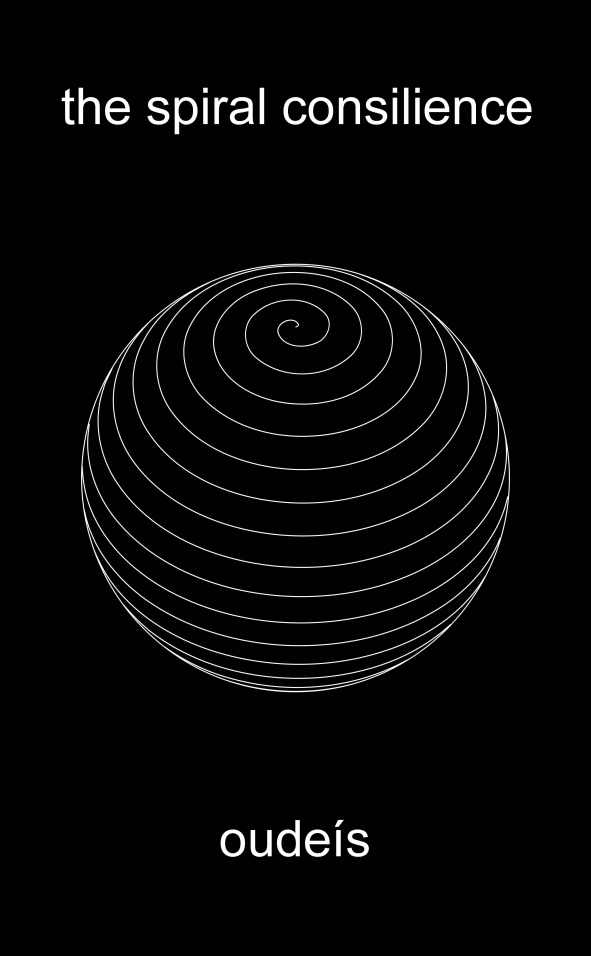
oudeís, the spiral consilience, gnOme, 2016.
read it at Google Books
This chapbook starts by directly addressing humankind’s connection to the vastness of outer space, and sets forth the premise that death (as a permanent state of being) is of the same substance, or soul, as whatever exists outside of the Universe. It then veers off on a tangent into stranger territory, and talks of unnamed worlds, without life yet possessed by some unliving, sentient force, whose spheres have drifted to the most distant regions of outer space; or, more properly, into the nothingness that reigns illimitably outside of space, where it has been speculated that no laws of nature can exist. Gigantic, otherworldly graves abound in rhyming descriptions of lifeless geographies. Monuments, catacombs and buildings, all deserted and of unknown origin, are lyrically narrated into existence deep beneath the surface of the Earth, as well as on and under the surfaces of distant asteroids. Alien cenotaphs resembling something Hugh Ferriss might have sketched from a fever dream are articulated through regular, metered verse. A sinister thread connecting all these massive structures with the aforementioned sentient force, which we are told holds all life and death in its grip, runs through the poems. Hymns to the universe in all its barrenness are juxtaposed with landscapes of horror, all elegantly unscrolled in lurid poetics that are made all the more disturbing by their intentional symmetry. The final poem seems to be a negation of itself, plus all of the other poems in the volume. The book ends with several prose statements of a negative nature concerning the fate of humanity in the Universe.
Odysseus, in Homer’s Odyssey, plays upon his name—Ou-déis/Ou-tis meaning no-one/no-thing—in order, through nomenclatural disorder (or rather: division, divergence), to outwit and outwitness the Cyclops, a creature of singular vision and ultimately also of unbounded blindness. Oudeís, in The Spiral Consilience, sings a similar siren-song and sets out on a similar voyage, albeit one over the course of which the Ulyssean body, in turn, makes a rather mèticulous U-turn and turns out to be a Mètic Mœbius itself (the Mètic Mœbius stripped Bare by her Bachelors, Masters, Doctors and Readers). “Time left no corpse but infinite space”: here, in the first words of The Spiral Consilence, the corpus—the collated collection qua bound book—corporealises out of an excised yet all-the-more exquisite corpse. This excision is, precisely, an exacting and enacted kenosis: an open negation that finds affirmation on the very next page and then onward, on and on, from siren-song to siren-song—void vocalisation to vocalised void—to the ever-approaching parousia/ousia beyond the vale of the valley of death/revival/regression/recision-and-reclamation. The recitations herein—the{ir} excisions, recisions, and incantatory reclamations—are those of a rabid iconovore, and each of its devoured figures or forms informs in its deformation and in its devouring the various epitaphs (or rather, chronotaphs: there where time left no corpse but infinite space) of an incomplete whole, of an ongoing hole-complex, full of cross-cutting tunnels as vast as The Great Wall of China: there where they are digging The Pit of Babel qua Garden of Forking Paths (pace Borges and Kafka). Oudeís, in The Spiral Consilience, engraves in each chronotaph-epitaph—each poetic page—the gist and the widening/planet-wide gyre of the grave-digger, but a grave-digger set adrift on the seas, digging into the tides of today with the oar of Odysseus: that oar of {y}ore which turns out (in yet another Ulyssean U-turn) to be a Golden Rod or Rod of Divination, singing in its Sea-Slicing qua Dowsing-of-the Deep the siren-song of Wor{l}dly Icons and Other Conjurations.” —Dan Mellamphy


No comments:
Post a Comment
Note: Only a member of this blog may post a comment.